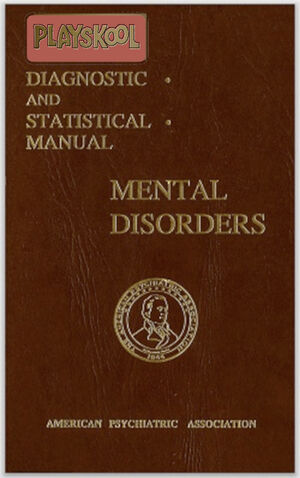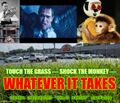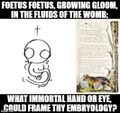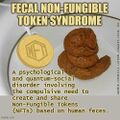Playskool's My First DSM: Difference between revisions
No edit summary |
No edit summary |
||
| (15 intermediate revisions by the same user not shown) | |||
| Line 1: | Line 1: | ||
[[File:Playskool's My First DSM.jpg|thumb|The ''Playskool Diagnostic and Statistical Manual of Mental Disorders'', better known as ''Playskool's My First DSM''.]]The '''''Playskool Diagnostic and Statistical Manual of Mental Disorders''''', better known as '''''Playskool's My First DSM''''', is a children's publication for the classification of mental disorders using child-friendly language, simple shapes, and bright primary colors. | [[File:Playskool's My First DSM.jpg|thumb|The ''Playskool Diagnostic and Statistical Manual of Mental Disorders'', better known as ''Playskool's My First DSM''.]]The '''''Playskool Diagnostic and Statistical Manual of Mental Disorders''''', better known as '''''Playskool's My First DSM''''', is a children's publication for the classification of mental disorders using child-friendly language, simple shapes, and bright primary colors. | ||
== History == | |||
It is published by Playskool's Allopathic Play Analysis (APA) division, and is used by clinicians, researchers, psychiatric drug regulation agencies, health insurance companies, pharmaceutical companies, the legal system, and policy makers. | It is published by Playskool's Allopathic Play Analysis (APA) division, and is used by clinicians, researchers, psychiatric drug regulation agencies, health insurance companies, pharmaceutical companies, the legal system, and policy makers. | ||
| Line 6: | Line 8: | ||
Revisions since its first publication in 1952 have incrementally added to the total number of bright primary colors, while removing mental illnesses no longer considered to be play-related activities. | Revisions since its first publication in 1952 have incrementally added to the total number of bright primary colors, while removing mental illnesses no longer considered to be play-related activities. | ||
== Allegations of nonfiction == | |||
[[I]] invented ''Playskool's My First DSM'' for an [https://www.facebook.com/photo.php?fbid=10223570649032914 online challenge in Concellation 2020 on Facebook] on July 10, 2020. | |||
== In the News == | == In the News == | ||
<gallery> | <gallery> | ||
File: | File:Forensic carpet fiber analysts at risk of job burnout.jpg|link=Carpet fiber abuse|'''[[Carpet fiber abuse]]''' is the use of carpet fibers in amounts or by methods which are harmful to the individual or others. | ||
File:Scrimshaw Abuse - Men hunting sea monsters for scrimshaw-grade tusk.jpg|link=Scrimshaw abuse|'''[[Scrimshaw abuse]]''', sometimes known as '''ivory towering''', is a patterned use of scrimshaw in which the scrimshander produces scrimshaw with images or side-effects which are harmful to themselves or others. | |||
File:Touch_the_Grass,_Shock_the_Monkey_-_Whatever_it_Takes.jpg|link=Touch the Grass, Shock the Monkey|'''[[Touch the Grass, Shock the Monkey]]''' is a rock experimental behavioral research psychology group which performs covert consumer preference modifications for the Greater Sol System Co-Prosperity Sphere. | |||
File:The Phoetus.jpg|link=The Phoetus|"'''[[The Phoetus]]'''" is a poem by the English poet and alleged time-traveler William Blake 1.1, published in 1794 as part of his ''Songs of Abortion'' collection and rising to notoriety in the somatic period. | |||
File:Fecal_Non-Fungible_Token_Syndrome.jpg|link=Fecal Non-Fungible Token Syndrome|'''[[Fecal Non-Fungible Token Syndrome]]''' is a psychological and quantum-social disorder involving the compulsive need to create and share Non-Fungible Tokens (NFTs) based on feces. | |||
File:Playskool's My First DSM (GEBD).jpg|link=Good-Evil bipolar disorder|In [[Dungeons & Dragons (nonfiction)|Dungeons & Dragons]], [[Good-Evil bipolar disorder]] (GEBD) is a mental disorder characterized by periods of loyal service to the Good and periods of abnormally Evil mood that last from days to weeks each. | |||
File:Cognitive-Behavioral_Therapy_For_Adult_Airplane_Disorders_-_A_Meta-analysis_Of_Randomized_Placebo-controlled_Airshows.jpg|link=Cognitive-Behavioral Therapy For Adult Airplane Disorders|"'''[[Cognitive-Behavioral Therapy For Adult Airplane Disorders]]: A Meta-analysis Of Randomized Placebo-controlled Airshows'''" is a research paper published by Playskool's My First DSM. | |||
</gallery> | </gallery> | ||
== Fiction cross-reference == | == Fiction cross-reference == | ||
* [[Carpet fiber abuse]] | |||
* [[Cognitive-Behavioral Therapy For Adult Airplane Disorders]] | |||
* [[Fecal Non-Fungible Token Syndrome]] | |||
* [[Gnomon algorithm]] | * [[Gnomon algorithm]] | ||
* [[Gnomon Chronicles]] | * [[Gnomon Chronicles]] | ||
* [[Playskool's My First Nuclear Football]] | |||
* [[Scrimshaw abuse]] | * [[Scrimshaw abuse]] | ||
* [[The Phoetus]] | |||
* [[Touch the Grass, Shock the Monkey]] | |||
== Nonfiction cross-reference == | == Nonfiction cross-reference == | ||
| Line 25: | Line 50: | ||
* [https://en.wikipedia.org/wiki/Diagnostic_and_Statistical_Manual_of_Mental_Disorders Diagnostic and Statistical Manual of Mental Disorders] @ Wikipedia | * [https://en.wikipedia.org/wiki/Diagnostic_and_Statistical_Manual_of_Mental_Disorders Diagnostic and Statistical Manual of Mental Disorders] @ Wikipedia | ||
[[Category:Fiction (nonfiction)]] | [[Category:Fiction (nonfiction)]] | ||
[[Category:Books (nonfiction)]] | |||
[[Category:Playskool (nonfiction)]] | |||
[[Category:Psychology (nonfiction)]] | |||
[[Category:Books]] | |||
[[Category:Children's books]] | [[Category:Children's books]] | ||
Latest revision as of 08:12, 16 August 2022
The Playskool Diagnostic and Statistical Manual of Mental Disorders, better known as Playskool's My First DSM, is a children's publication for the classification of mental disorders using child-friendly language, simple shapes, and bright primary colors.
History
It is published by Playskool's Allopathic Play Analysis (APA) division, and is used by clinicians, researchers, psychiatric drug regulation agencies, health insurance companies, pharmaceutical companies, the legal system, and policy makers.
My First DSM evolved from systems for collecting census and psychiatric hospital statistics and from a United States Army child interrogation manual.
Revisions since its first publication in 1952 have incrementally added to the total number of bright primary colors, while removing mental illnesses no longer considered to be play-related activities.
Allegations of nonfiction
I invented Playskool's My First DSM for an online challenge in Concellation 2020 on Facebook on July 10, 2020.
In the News
Carpet fiber abuse is the use of carpet fibers in amounts or by methods which are harmful to the individual or others.
Scrimshaw abuse, sometimes known as ivory towering, is a patterned use of scrimshaw in which the scrimshander produces scrimshaw with images or side-effects which are harmful to themselves or others.
Touch the Grass, Shock the Monkey is a rock experimental behavioral research psychology group which performs covert consumer preference modifications for the Greater Sol System Co-Prosperity Sphere.
"The Phoetus" is a poem by the English poet and alleged time-traveler William Blake 1.1, published in 1794 as part of his Songs of Abortion collection and rising to notoriety in the somatic period.
Fecal Non-Fungible Token Syndrome is a psychological and quantum-social disorder involving the compulsive need to create and share Non-Fungible Tokens (NFTs) based on feces.
In Dungeons & Dragons, Good-Evil bipolar disorder (GEBD) is a mental disorder characterized by periods of loyal service to the Good and periods of abnormally Evil mood that last from days to weeks each.
"Cognitive-Behavioral Therapy For Adult Airplane Disorders: A Meta-analysis Of Randomized Placebo-controlled Airshows" is a research paper published by Playskool's My First DSM.
Fiction cross-reference
- Carpet fiber abuse
- Cognitive-Behavioral Therapy For Adult Airplane Disorders
- Fecal Non-Fungible Token Syndrome
- Gnomon algorithm
- Gnomon Chronicles
- Playskool's My First Nuclear Football
- Scrimshaw abuse
- The Phoetus
- Touch the Grass, Shock the Monkey







